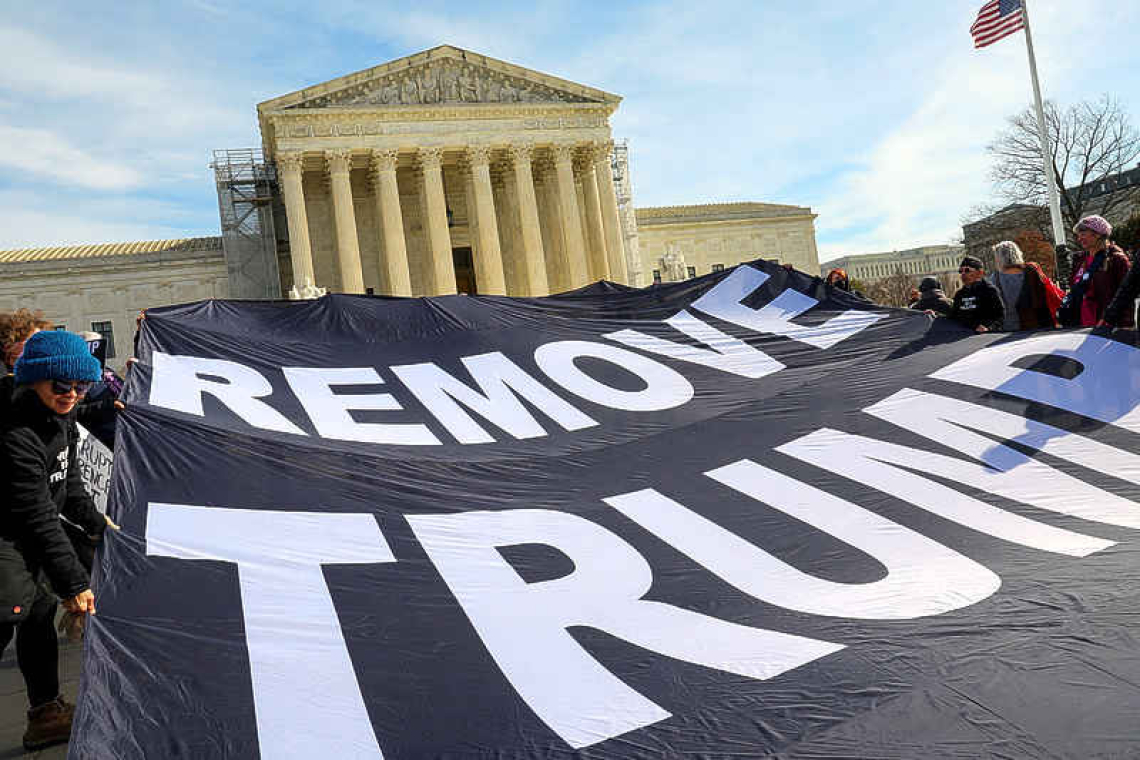WASHINGTON--Donald Trump appeared to be headed for a big legal victory at the U.S. Supreme Court as the justices on Thursday signalled their readiness to reject a judicial decision kicking the former president off the ballot in Colorado for taking part in an insurrection during the 2021 Capitol attack.
The nine justices heard about two hours of arguments in Trump's appeal of a Dec. 19 ruling by Colorado's top court to disqualify him from the state's Republican March 5 primary ballot under the U.S. Constitution's 14th Amendment after finding that he participated in an insurrection. The ruling in the case promises major implications for the Nov. 5 election. Trump, who did not attend the arguments, is the overwhelming frontrunner for the Republican nomination to challenge Democratic President Joe Biden. Section 3 of the 14th Amendment bars from holding public office any "officer of the United States" who took an oath "to support the Constitution of the United States" and then "engaged in insurrection or rebellion against the same, or given aid or comfort to the enemies thereof." Justices - conservatives and liberals alike - expressed concern during the argument about states taking sweeping actions that could impact a presidential election nationwide. They pondered how states can properly enforce the Section 3 disqualification language against candidates, with several wondering whether Congress must first pass legislation do enable that. The Supreme Court's 6-3 conservative majority includes three justices appointed by Trump. Conservative Chief Justice John Roberts told Jason Murray, the lawyer representing four Republican voters and two unaffiliated voters who sued to keep Trump off the Colorado ballot, that if the judicial decision were to be upheld, other states would proceed with disqualification proceedings of their own against either Democratic or Republican candidates. "It'll come down to just a handful of states that are going to decide the presidential election. That's a pretty daunting consequence," Roberts said. Anti-Trump forces have sought to disqualify him in more than two dozen other states - a mostly unsuccessful effort - over his actions relating to the Jan. 6, 2021, Capitol attack. But Maine also has barred Trump from its ballot, a decision on hold pending the Supreme Court's Colorado ruling. "I think that the question that you have to confront is why a single state should decide who gets to be president of the United States," liberal Justice Elena Kagan told Murray. "This question of whether a former president is disqualified for insurrection to be president again ... it sounds awfully national to me." Conservative Justice Brett Kavanaugh, a Trump appointee, focused on the impact to democracy if states under Section 3 can block candidates from their ballots under Section 3. "Think about the right of the people to elect candidates of their choice, of letting the people decide, because your position has the effect of disenfranchising voters to a significant degree," Kavanaugh told Murray. Murray offered a blunt reply: "The reason we're here is that President Trump tried to disenfranchise 80 million Americans who voted against him, and the Constitution doesn't require that he be given another chance." Trump supporters attacked police and swarmed the Capitol in a bid to prevent Congress from certifying Biden's 2020 election victory. Trump gave an incendiary speech to supporters beforehand, telling them to go to the Capitol and "fight like hell." He then for hours rebuffed requests that he urge the mob to stop. The 14th Amendment was ratified following the American Civil War of 1861-1865 in which seceding Southern states that allowed the practice of slavery rebelled against the U.S. government. "The framers of Section 3 knew from painful experience that those who had violently broken their oaths to the Constitution," Murray said, referring to the officials of the seceding states, "couldn't be trusted to hold power again because they could dismantle our constitutional democracy from within."







